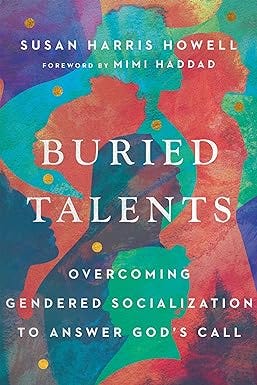Buried Talents and Disa's Plea to the Rocks
What does it mean for women to speak or give testimony? What does it mean for women to proclaim, exhort, preach, or prophesy? Whose voice has been trapped in rubble? Whose voice sings release?
Some denominations support women who testify, teach, give a word, share, prophesy, or speak, even if the word “preach” is off the table – or pulpit.
The vast majority of women don’t enter pastoral leadership to talk about women in ministry. You’re called to hold a dying man’s hand, break bread, baptize, authorize benevolent funds, write sermons, unlock the church for recovery group meetings, perform funerals for people you’ve loved and people you’ve never met, go spelunking in caves with Youths, hire staff, visit jails, sit in hospital waiting rooms, sit in millions of committee meetings, plant churches, and sometimes, Lord have mercy, to perform weddings (bless you, pastors).
Of all the elements of ministry, proclaiming the Word of God on a Sunday morning seems to be where “the rubber meets the road” for women, in North America at least: even in environments where women’s leadership is robustly affirmed, women testify to watching people join in worship right up until the sermon – then pointedly standing up to leave.
Women in pastoral ministry already know this, it’s not new. But I’ve been working on a project that’s had me neck-deep in womens’ voices in the Body of Christ around the world, across millenia. The more I find on womens’ leadership and ministry in the church and academy (over 1,400 links at the moment), the more my fury solidifies into something iron.
Because that’s the weird part. The more I find, the deeper the fury runs.
Recently a former professor passed away. I only had one class with her, and I was surprised to find how significant the loss felt. I wasn’t an MDiv student in seminary, I focused on theological studies; of all the church history classes I took in college and seminary, Dr. Meesaeng Lee Choi was the only woman to teach me church history.
One day during discussion in my class on the early church, I asked a question to clarify something Dr. Choi said. She gave me the pitying smile of someone who’s watching naivete play out in front of them, but it also carried a subtle edge of academic-nerd sympathy.
We were talking about the substantive amount of primary sources from the early church that simply had never been translated. Ever. I don’t recall if the conversation was about women or about primary sources in general. I just remember sitting there stunned.
Dr. Choi came to mind the other day when I read the summary of a book included in an upcoming FireFall newsletter. What do you mean, this is the first time Hildegard of Bingen’s homilies on the Gospels have been translated from Latin into English? This was published in 2011! Frustration spilled over and there I sat; I’d burst into tears over history, not for the first time, and I’m certain not for the last.
Except it’s not just over history, is it? It never is.
It’s women advancing through the ordination process, not being able to find a congregation that will host their final practicum requirement, and finally dropping out of ministerial preparation because they’re unable to fulfill a final requirement due to something beyond their control.
It’s Hildegard’s sermons not being valued enough for centuries to be translated into a widely used language for distribution beyond the scope of scholars until 2011 - when a woman saw to it. A woman’s sermons. (Hildegard lived from around 1098 to 1179 - about 845 years ago. Let’s be generous and account for Gutenberg’s printing press and the process of common Shakesperean English standardizing the language. It still took 400 years for someone to translate a well-known, studied, respected woman’s homilies into English.)
It’s women pastoring churches whose male colleagues refuse to pray with them at district events, when pastors break into groups for prayer.
It’s Anne Askew, tortured and martyred for reading Scripture in public.
It’s my gifted, anointed friend who was told by a church board, “we’re not looking for a woman, much less a Black woman.”
It’s me not learning about Candida Xu until I was over 40.
It’s Lady Jane Grey, beheaded for winning a theological debate.
It’s a woman minister being left stranded on the roadside because her male colleague refused to be alone in the car with her for a short ride.
It’s the boatloads of books, photos, paintings, documents, records, mosaics, funerary inscriptions, liturgies, archives that have been here all along – filed away, physically obscured, untranslated, omitted from research, ignored, left to go out of print. Buried.
Just one small example: Quaker Margaret Fell published on women’s right to preach in the 1600s. (Decades before in the 1500’s, Scottish Reformer John Knox didn’t think women should be monarchs and wrote, “The First Blast of the Trumpet against the Monstrous Regiment of Women.”) English Quaker and Baptist women preachers in the 1600s were scathingly labeled “She-Preachers.”
I’m very thankful every time I come across male scholars who illuminate womens’ contributions, they’re more rare than they should be (this week’s “thank you” goes to Dr. Daniel Isgrigg for refusing to allow Mildred Wicks to disappear).
Recently, I read an academic journal article summary about women of means at one point “speaking” through architecture, making their views known by becoming patrons of particular sculptors and projects – a different take on stones crying out.
Sometimes women speak in stone.
Or maybe it’s a bit different.
There’s a spine-tingling scene in “The Rings of Power” when a character (the Dwarf Disa, played by Sophia Nomvete) “resonates” stone, singing reverberation through rock. Decider describes it this way: “We already knew that Disa could ‘resonate’ with the mountain, using singing to probe the stone for ore or danger. However in this episode, we watch as she sings the astounding ‘A Plea to the Rocks’” – why? Four Dwarves who were mining are trapped in rubble and, “Disa sings her ‘Plea to the Rocks’ to ask the stone to release these dwarves, preferably alive.”
The Spirit does this to our hearts all the time, uncovering the waste or treasure, the dangerous or beautiful, revealing and setting free.
When we proclaim - when we sing, “the mystery of the faith: Christ has died, Christ is risen, Christ will come again,” the Spirit has a way of infusing our song to shake the rubble of our world and of our shared story, freeing the testimonies of those who, like the miners in the story, have been trapped by the ambition or greed of others ready to bury their companions in pursuit of power.
Margaret Fell, Hosokawa Garasha, Hildegard of Bingen, Zilpha Elaw, Felicity and Perpetua, Catherine Booth, Julia Foote, Brigid of Kildare, Li Tim Oi, Pandita Ramabai, Hilda of Whitby, Mary Lee Cagle, Nenilava, Dorothy Day, Santos Elizondo, Theresa of Avila – and thousands and thousands of others – can you hear them?
Can you hear them exhorting us? The great cloud of witnesses, singing in the Spirit? Resonating hard stone with Truth, Beauty, Righteousness, Justice, Goodness?
Speak, testify, proclaim, exhort, prophesy, teach, give a word, share. Sing.
Preach.
Go on, She-Preacher. What are you waiting for?
Sing along.
FireFall is a weekly ecumenical newsletter amplifying the voices of women in pastoral leadership and higher education. It celebrates women leading around the world currently and throughout church history. Resources celebrated in FireFall include practical tools, denominational spotlights, books, podcasts, lectures, videos, events, articles, and more. Launched in fall 2023, FireFall now has a generous volunteer beginning to translate resources into Spanish, which can be found in the Fuego Descendió tab.
Check tabs on the home page to browse 2024 conferences for women in church leadership, as well as a list of online databases of women leading in church and higher education.
FireFall is a labor of love and does not receive grant money or supporting funds from any organization or denomination. You’re invited to become a free or paid subscriber as your means and situation allow.
Read more about Elizabeth Glass Turner here.





I hear that great cloud of witnesses! Thanks for this post.